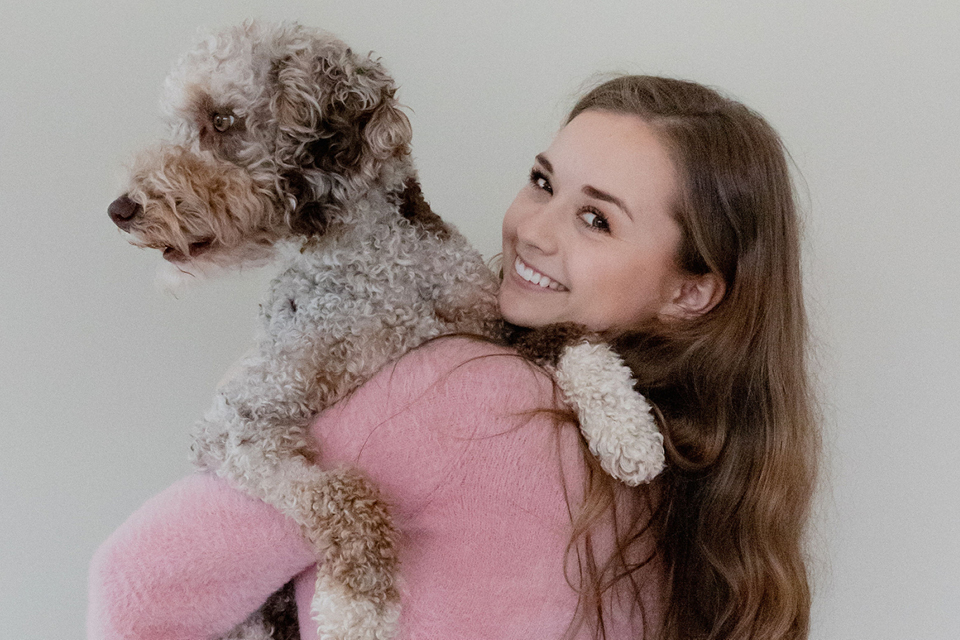Jumping for joy
Peter B. Gustavson School of Business
- Natalie Bruckner

Danielle Lowe, winner of the inaugural Gustavson Business Start-Up Competition, gets a boost for her cricket-based dog treat business Doodlebug Pet Food
Danielle Lowe, BCom student, is elbow deep in crickets—quite literally. Lowe is the mastermind behind Victoria-based Doodlebug Pet Food, a company that makes hypoallergenic cricket-based treats for dogs. As we chat, another online order comes in, and that brings her total sales to date to 750 units, which means Lowe has painstakingly created 90,000 cricket dog treats by hand.
Start-up competition
Last year, Lowe was awarded $20,000 to help get her business off the ground when she won the inaugural Gustavson Business Start-Up Competition. Her vision, to be the leading sustainable-protein company that enhances dog health and wellness, caught the eye of the judges. (David Chan from Third-Culture Chili Oil came in second and was awarded $10,000.) “At the end of the day, we believed that both ventures were highly doable,” says Brock Smith, Gustavson’s professor of entrepreneurship and marketing who hosted the competition last August. “They didn’t require much to get started and had great growth potential. That, and the passion, enthusiasm and commitment of the entrepreneurs that they will follow through with their venture.”
It was exactly the morale and cash boost Lowe needed. To say the past 12 months have been a bit of a whirlwind would be an understatement. What started out as an idea to create a mealworm burger for humans to help solve deforestation problems has become a quickly-growing business in the highly competitive dog treat market.
Crickets as food
“I learned about entomophagy [the practice of eating insects] during one of my pre-core electives, and it piqued my interest,” says Lowe, who is in her final year of the program. “My initial focus was on high-protein insects as food for humans, but that changed when my sister’s dog, Billie, became sick and we realized she had a meat intolerance. I discovered that crickets are a sustainable and rich source of protein for dogs, too, and that up to 30 per cent of dogs suffer from meat intolerance.”
Unsure whether or not her idea would be a viable business option, Lowe approached her professors and was pointed in the direction of the Coast Capital Savings Innovation Centre—she joined the centre’s venture incubator, entered a pitch competition and won. “It made me realize this was a good idea,” she says. “I decided to structure the rest of my BCom around the business and took an entrepreneurship specialization a year early.”
Lowe had entered into a growing industry; the crickets market is expected to be worth $8 billion by 2030 (Barclays Investment Bank), and her idea had captured the interest of the entrepreneurship faculty. She was invited to enter the inaugural Gustavson Business Start-Up Competition, which offered $30,000 in seed funding thanks to two donors, Andrew Wilkinson and Ellen Cmolik.
Student entrepreneurs
Smith views the Business Start-Up Competition as being extremely important for the entrepreneurship program. “We welcome around 90 to 110 students a year into the program and our role is to get them to the point of being investor-ready with a venture. Typically, however, only one or two ventures a year get off the ground because these students have gone through four years of university, living off co-op work term money and many have student debt. They aren’t really in a position to take a chance and launch a business—which makes them think entrepreneurship isn’t a viable option.”
The competition, however, helps change that: “We are so fortunate to have donors who see the value in this and who have made a commitment to support young entrepreneurs—to have a little bit of assistance during the first six months of a venture goes a long way. It also makes a huge difference for the students to know people value what they are doing,” says Smith.
For Wilkinson, founder of Tiny (a long-term holding company for businesses that specialize in acquiring majority or whole stakes in internet companies), supporting new ventures is something he is extremely passionate about. “I’ve been there and I know how hard the startup phase is, but it really is the most exciting time of any business. I love getting a taste of that and hopefully helping young entrepreneurs avoid a few potholes along the way,” he says.
Those sentiments are echoed by Ellen Cmolik: “Entrepreneurship is an important theme in my own life. This path in life takes incredible drive, passion, hard work and determination. I’d like to support emerging entrepreneurs to create their own legacies in business and better serve our local communities.”
Lowe’s venture fit the bill. She was nominated from the summer entrepreneurship specialization and invited to be one of four finalists to present to a team of judges.
Having observed the competition, Wilkinson says that Lowe’s pitch stood out.
She had clearly been working on the business for over a year, which I felt showed she took it seriously. Sticking with something requires a lot of grit, and she clearly was insanely passionate about what she was doing.”
—Andrew Wilkinson, founder of Tiny
The way ahead
Lowe has since put the money to good use, investing in new marketing material, packaging, ingredients, farmer’s market tents and a new machine to speed up the process. She is even considering hiring a summer co-op student, as grants are available to cover part of the cost.
For now, Lowe remains extremely hands-on. She tastes every recipe herself before trialling it on a panel of furry taste-testers. When asked what crickets taste like, she describes them as “nutty in flavour.”
Starting a business at 21 years of age can be daunting, Lowe says, but her advice to fellow young entrepreneurs is this: “It’s OK to be worried about starting a business at a young age, but the fact is, there’s less risk because you have fewer responsibilities. Also, you’re eligible for a ton of grant opportunities. Not only has the money helped me launch [at a time] when perhaps it wouldn’t have previously been feasible, but winning the competition and working with Andrew afterwards cemented the fact that this is a good idea and helped me network with other people in the community, too.”

